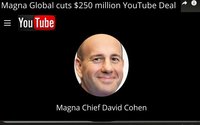Magna Cuts $250 Million NewFront For YouTube, Part Of 3-Year 'Preferred' Google Deal
- by Joe Mandese @mp_joemandese, May 4, 2016
 In an announcement that is reminiscent
of the kind of stories that would kick-start the golden age network upfront TV advertising marketplace, Interpublic's Magna Global unit and Google released news that they have struck a $250 million
"newfront" deal for Magna's clients to run on YouTube.
In an announcement that is reminiscent
of the kind of stories that would kick-start the golden age network upfront TV advertising marketplace, Interpublic's Magna Global unit and Google released news that they have struck a $250 million
"newfront" deal for Magna's clients to run on YouTube.
Precise terms were not disclosed, but it is a nine-figure deal covering five quarters on YouTube and was part of a three-year deal with Google negotiated by Magna U.S. President David Cohen and his team.
The story, which broke in The Wall Street Journal as part of Google’s PR strategy for creating marketplace buzz, was the kind you might have expected to trigger network upfront deal-making in the frenetic marketplace of the 1980s, when big agency media buyers would rush for bragging rights on the first deal of the season.
advertisement
advertisement
“Year One represents the largest Google Preferred deal ever signed, affording our clients competitive rates and access to cutting edge measurement and the latest YouTube talent,” Magna stated in the announcement, adding: “Years two and three will continue to provide efficiencies and value for our clients whilst also focusing on an innovative learning and measurement partnership as we seek to understand the optimal mix and usage of digital video with other marketing channels (like linear television).”



Have Magna's clients signed off on this? I tend to doubt it.
Attention Magna clients: watch your wallet.
This will probably inspire some of our wishful thinkers into believing that at last the large "traditional" agencies are "embracing" digital video. However for every dollar Magna spends on YouTube it probably spends $24 on "TV". Is the claim that this represents a diversion of funds from "TV" really true or is this just another propaganda ploy to intimidate upfront TV sellers in advance of the negotiations? One can only wonder.